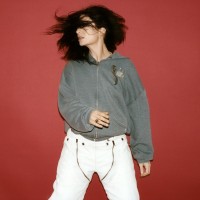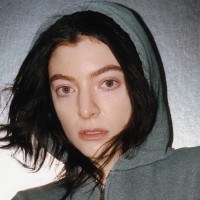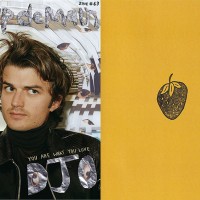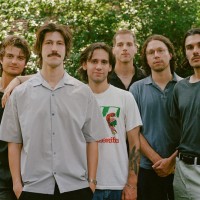Interview: Halsey on her debut album, 'Badlands'.
Interview: Halsey on her debut album, 'Badlands'.
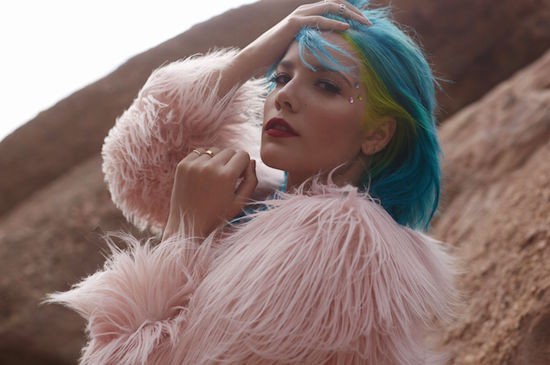
"If I'm not offending anyone's race or creed or beliefs to a level of political incorrectness, then why do I have to fucking please anyone? I have no-one to please," says twenty-year-old singer/songwriter, Ashley Frangipane - best known by her stage-name of Halsey (which is an anagram of her name).
And just like her musical anthems of empowerment - in 'Hurricane' she sings, "Don't belong to no city / Don't belong to no man" - Ashley wears her heart on her sleeve and is unapologetically honest in conversation; a manifest indomitable life-force.
Coup De Main caught up with Halsey recently to discuss her upcoming debut album, 'Badlands', as well as the culture of slut-shaming, and the value of fandoms...
"...whoever you are in love with, your partner does not define you. Because at the end of the day you need to be your own best friend."
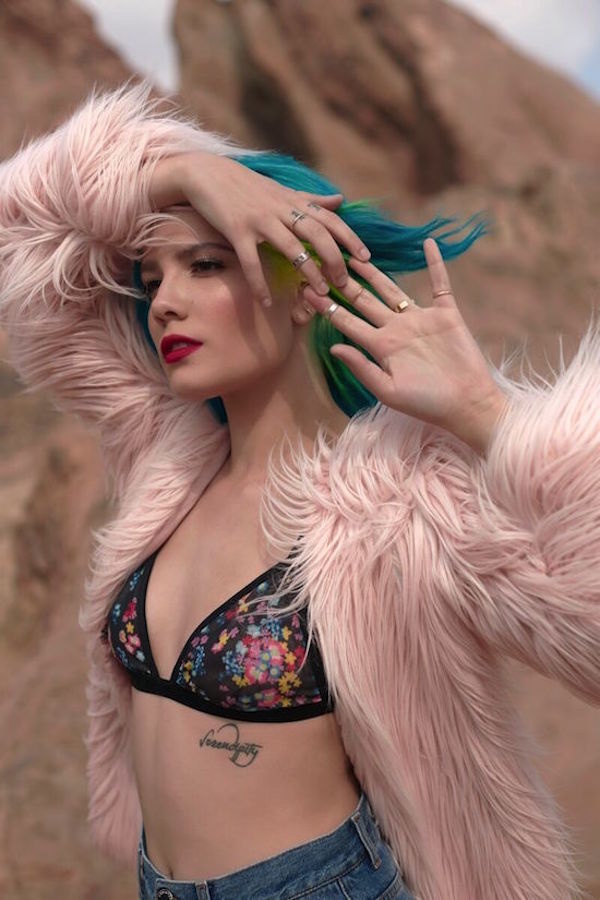
COUP DE MAIN: Do you view your album 'Badlands' as an alternate universe? Or an extension of your existing universe?
HALSEY: I think I've said before that it's like a metaphor for my mental state, so 'Badlands' is kind of like my only universe. I think it's representative of a state of mind. For me, there's a booming metropolis inside of 'Badlands' - that's where my cognitive activity happens and that's where I've been living, if you will, for the past few months. Then ultimately I made the decision to leave and venture out into the wild, isolated wasteland that surrounds the 'Badlands'. It's just wide open desert. So it is my universe; it’s just my universe as interpreted by me.
CDM: You’ve described 'Badlands' as an "angry feminist record", but songs like 'Hurricane' are also triumphant narratives in which you declare your independence: "Don't belong to no city / Don't belong to no man." Obviously, feminism has a long history of struggle and we continue the fight still today, but do you think there’s also joy to be found within the feminist movement - like the solidarity of sisterhood when other girls listen to 'Hurricane' and can empathise with your lyrics?
HALSEY: Yeah for sure. Real quick while I have the opportunity, I’ve corrected this a couple of times but I was misquoted and now it's the bane of my existence having to continuously correct because they won't retract the quote. I said an 'angry female record', and it got misquoted as 'angry feminist record', which go figure - having commented about feminism and then I get misquoted by a man, as I would. Oh, naturally! Bit of irony there. However, I think that feminism has existed for centuries and we are not the first generation to embrace feminism and we won't be the last. I think that there is some sort of solace to be found in the idea of joining together with people who have a similar goal as you. Just like any radical movement, as feminism used to be interpreted as, you find family, and you find relatability, and you find people with the same intentions as you fighting for the same cause as you and it brings people together. I don't think there's anything negative to be found about it. I think that we're making incredible progress and I think the steps we are making in the mainstream in feminism is going to be incredibly essential for the long road we have ahead.
CDM: 'Castle' makes quite bold statements as your album’s opening-track - especially the line: "And there's an old man sitting on the throne that's saying I should probably keep my pretty mouth shut." Was it inspired by your personal experiences with the music industry?
HALSEY: Yeah absolutely, and I think it's kind of figurative. It doesn't speak to my record company specifically - my record company is actually incredible, they let me do pretty much whatever the hell that I want, they're incredibly encouraging and they understand that this is my project and they have left it in my hands to do what I want with it. I think the old man is kind of just representative of a patriarch. When I first started out there were moments when I'd be wearing something and then I’d rock out on stage and think something like, ‘Is this too revealing? Is this too blah blah blah?' Or, 'Should I not say this? Maybe I shouldn't curse.’ And then I think I eventually just starting being like, 'Why the fuck do I care? Why do I care? If I'm not offending anyone's race or creed or beliefs to a level of political incorrectness, then why do I have to fucking please anyone? I have no-one to please.' I think that is kind of what that song signifies - my entry into the music industry, and the realisation that I don't have to follow anyone's rules.
CDM: It’s a convention in pop music for women to be represented as apologising and/or playing the victim. Being so closely connected to your young fans and also being a young woman yourself, do you find it frustrating that pop music narratives represent females so narrowly?
HALSEY: I just think that it's important for any songwriter, male or female, to write from a well-rounded perspective and there's definitely a lot of apologetic women in music and I don't think that that there have been for the history of music. Sometimes I'm not the victim, sometimes I'm the antagonist. Sometimes I'm the one who causes the trouble or causes the pain, because I'm a human. Bad things aren't always happening to me, sometimes I'm the bad thing happening to someone else. As a songwriter who wants to cover all the bases and write from a realistic perspective, I think it's important for me to include those perspectives. I would consider it refreshing if that became the industry standard.
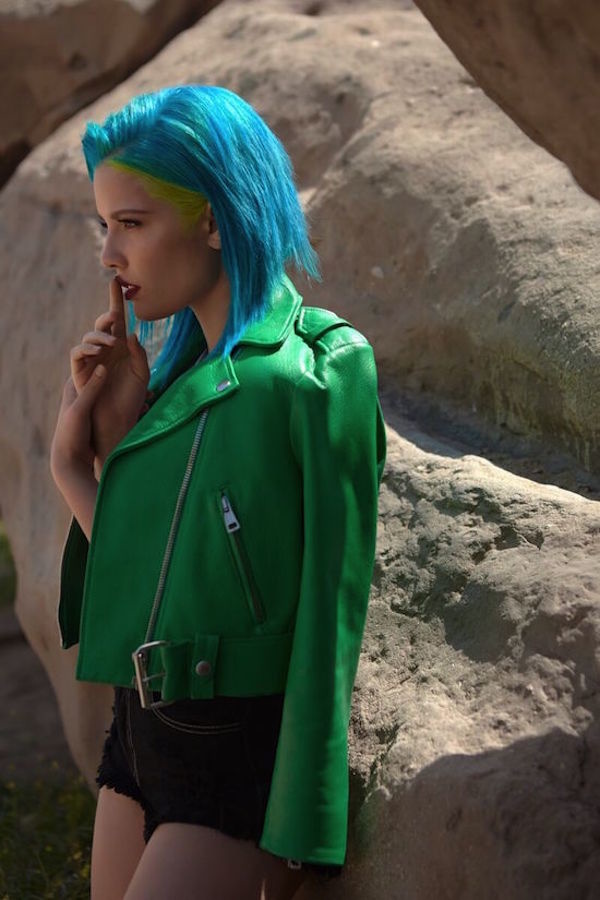
CDM: Do you think there’s a double-standard in the music industry that works against female artists being able to portray themselves romantically or sexually, without being objectified or over-sexualised?
HALSEY: Absolutely. 100%. I grew up idolising male artists - I loved Mick Jagger, I fucking loved Alex Turner from the Arctic Monkeys, I loved musicians who moved romantically and sexually on stage. One of the greatest opportunities I had was touring with Luke Pritchard from The Kooks, and he's a very, very sexy, very androgynous man on stage and I admire him tremendously for that. I do something similar and I get a backlash, like, ‘Oh, I dance like a slut on stage.' That word drives me insane because it shouldn't exist. First of all, sexual partners doesn't make it okay for you to call someone a derogatory term. Second of all, if it were okay, the way that I dance on stage would not attribute to how many sexual partners that I've had. I find more and more that the more open I am, the more embracing I am of the things I admired in male artists, the more I find people saying, 'Well I'm not really comfortable with that' or 'I don't really like that' or 'I don't think she should be doing that.' It kind of just makes me wonder, ‘cuz I can pull up six references of male artists in this day and age who are doing the exact same thing that I am and it doesn't discourage me, if anything it makes me want to do it more, that someone is normalising it. But at the end of the day my main goal is to own my sexuality and maintain that sexiness is a state of mind - it's not how you look, it's not how you dress. If I can own that fact then I can own the sexual nature of myself, then no-one can objectify me because it's in my power, it's in my hands.
CDM: In more general terms, how do you think we can move away from a culture of slut-shaming?
HALSEY: I just think that it needs to become more normalised. I see an outburst of girls posting pictures - obviously I would like to see girls of age posting pictures because I don't think child pornography is ever acceptable because it's a toxic behaviour and it's endangering. I think that body autonomy and having a knowledge of your body and understanding your sexuality is important when you become an adult. The more that it's women owning that fact and deciding their sexuality to their own standards - not necessarily women posed or dressed or stylised in a manner that people think is going to click-bait men - in a way that women find sexy. Because if a women finds herself sexy with armpit hair and a turtleneck on and no makeup and that's what makes her sexy, then that's how we start taking that word back. Women need to take back the word sexy, because it’s become something from a male perspective. If women can take back what it means to be sexy and make it more of a state of mind, I think that we can eliminate the concept of 'slut' existing because then it's not up to men to decide if a women is being sexual or not - it's up to her. And in that case, if she's comfortable with it, how can you call her a slut?
CDM: We live in a world where an entire beauty industry revolves around body-shaming, and thinness is exploited as a privilege in entertainment industries. Do you think it’s dangerous that body privilege is such a powerful social advantage?
HALSEY: I absolutely do. I think it's disgusting that a women who’s thinner than another women can have a seat opened up for her on a train for example. Or could have something free given to her. Or is more likely to catch a cab, or is more likely to etcetera. I think that the privilege is in the same league as white privilege, where the way that a person looks should not determine the kind of advantages they have in this life. There's certain industries that are built on the way a person looks, modelling for example. Those things are maintained in those lanes, but in the real world I don't think that it's ever acceptable to give a women an advantage based on how she looks. I do think it's toxic; I think it's disgusting. I get comments all the time on my pictures and on my stuff. I wake up in the morning sometimes and I'm on tour so I'm exhausting an incredibly amount of physical energy and I'm losing weight rapidly and I look in the mirror and think to myself, ‘I’m getting too skinny.' Because it's not healthy for my body to be looking the way that maybe it does, because I know what my body's supposed to look like at a normal weight. When a girl looking at my pictures says, ‘You look fat,’ I think to myself that's ridiculous because I woke up thinking about how unhealthy I feel right now. I think the standard comes down to how shaming women into thinking they’re too thin or too fat for any certain reason, is a toxic mentality in society.
CDM: Like with most industries, the media industry is dominated by male voices, who traditionally - and as convention - belittle and trivialise the opinions and thoughts of teenage girls. E.g. Just because a young girl loves One Direction, doesn’t mean that her political viewpoints are any less valid; the two are not tantamount. What are your thoughts on the rise of young girls blogging their own think-pieces and engaging with their peers on an intellectual level online?
HALSEY: I think it's incredible. I agree 1000% that your taste in music doesn't undermine your intelligence, nor does your love for things that teenage girls love make you less mature, or less socially aware. I mean, I fucking loved One Direction in high school, I get shit for that all the time - 'I’m not indie enough, I'm not alternative enough, I'm not smart enough, I'm not edgy enough, I'm not whatever because I like One Direction.' I fucking like One Direction! I like pop music! I thought they were great. I thought they were a tremendously successful project and it's something that I enjoyed because the music was catchy; I was fucking sixteen-years-old! All the while I was in AP classes and I was dating guys who were taking drugs and I was watching my friends die. Liking One Direction didn't take away from any of the life experiences that I had, if anything they were just a part of my eclectic and well-rounded taste in music and I think it's amazing that girls are blogging and that girls are sharing information. Young adults in general, not just girls. I see so many kids on Twitter and on Tumblr who are sharing information with each other - educating each other on their religions, educating each other on what's going on in their countries because the Internet has opened up a global forum for people to talk about what's happening all over the world. Educating people on other viewpoints from certain race and from certain class and from certain religion. I think that's a fucking incredible thing that the Internet has given us, and I think a lot of it comes from fandom. I think a lot of girls who love bands like One Direction or love bands like 5 Seconds Of Summer and Fifth Harmony feel comfortable with each other because they all like the same thing. That comfortability is what lets them feel like it's okay to educate each other. So if anything I think that love for One Direction is making people more intelligent, so fucking fuck that!

CDM: Do you think it’s important to break down society’s pre-conceived notions and expectations that women are always expected to have a man in their life or they’re a failure?
HALSEY: Absolutely. Most of my music is about not belonging to a man or about my experiences removing myself from toxic relationships, and experiencing being single and embracing who I am as a person. The person who you are with does not define you. And it’s the most important thing that girls need to learn these days, be it a man or be it a woman - whoever you are in love with, your partner does not define you. Because at the end of the day you need to be your own best friend.
CDM: The disparity between low income and high income earners has become more and more imbalanced, but it’s not something widely discussed in pop-culture, so it’s super heart-warming to see you educating your fans on donating care-packages to the homeless. Why is this important to you?
HALSEY: I went through a really, really difficult time when I was eighteen where I left home - it was my own decision, my parents are incredible parents they would never put me in a position of neglect, but I left and I was trying to figure myself out. There were some nights where it was rough and I didn't have a couch to sleep on and the streets are dangerous. I have friends who have fallen victim to drug addiction or who have fallen victim to mental illness or things that have put them on the street. I just think it's important to remember when you're walking past a homeless person, you're walking past a life. You're walking past 20, 30, 40, 50, 60 years of living. That person went to high school, that person had a family, that person is someone's child, that person has likes, they have a favourite band, they have a favourite food - ask them about it! Give them a quality of life, because the majority of time the thing that keeps people on the streets is a lack of will to live. If you give someone a will to live and remind them that the world is kind, it's just a little more encouragement for them to keep their head high and perhaps change the position that they're in.
CDM: We currently don't have a release date for your album yet in New Zealand, but when are you going to come and visit us?
HALSEY: I'm coming very, very soon! I've heard that your Summers are beautiful and there's nothing more I'd like to do than leave an American Winter. <laughs> So hopefully I can make that happen at some point. As far as the record, I'm not sure when it will be coming out for New Zealand and Australia, but that's going to be up to how well I'm received over there on the radio in the next few months and how much the fans respond and if we think we can knock this thing out of the water. But I'm pretty confident. I think that my fans in New Zealand are incredible and massively supportive and I'm looking forward to seeing their reactions when they finally get 'Badlands'.
Halsey’s debut album 'Badlands' is out worldwide on August 28th. Click HERE to pre-order now via iTunes!
Watch Halsey’s music video for 'Ghost' below...









